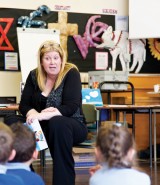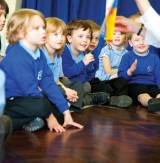Nikki Gamble is searching for children's books with soul. Joe Carter see what she's discovered at Lark Rise Primary School...
“You’ll have to take me as you find me,” says Nikki Gamble, owner of the Just Imagine Story Centre in Chelmsford, when I call that morning to confirm our meeting at Lark Rise Primary. Nikki is due to hold a book fair, but she’s feeling under the weather and is concerned she may not be “on top form”. However, with years of experience as a teacher, teacher trainer and educationconsultant, I have the feeling her practised skills of presentation will see her through.
When I arrive that afternoon, I find Nikki with an armful of stories, laying tables for the book sale that’s due to take place when parents appear at the end of the day. There’s an appealing combination of children’s classics and more recent favourites – Dogger and Each Peach Pear Plumoverlap copies of Kes Gray’s 006 and a Half and Jeff Kinney’s Diary of a Wimpy Kid. It’s a collection that induces a pleasant mix of nostalgia and curiosity.
As you’d expect, Nikki knows her books and it’s the knowledge she has accumulated as a teacher and lecturer that informs her selection for the fair. Among the thousands of children’s titles published each year, there will be relatively few Gruffalos or Hungry Caterpillars: books with the elusive power to beckon readers into a wider imaginative space. For Nikki, it’s her ability to divine such literary gems, or “Books with soul”, as she describes them, that makes Just Imagine’s selection less hit and miss when compared to more “corporate” book fairs.
So which authors create books with soul? “Shaun Tan?” I suggest.
“Yes.” And we’re off. On the subject of books and authors, Nikki’s passion shines through, cold or no cold. She picks up a paperback from the table: Eric Carle’s Draw Me A Star. Flicking through the pages, Nikki considers what makes his style so evocative. “You might have books with clever illustrations and fantastic typography, but they don’t necessarily have depth of soul,” she posits. “I think what Eric Carle does is to leave lots of space for the reader’s own thoughts. My pet hate is books that are overly didactic – something like The Rainbow Fish. It tells the reader exactly what to think. I am looking for stories and illustrations with emotional depth, like the books by Brian Wildsmith, John Burningham, Polly Dunbar, or, more recently, Petr Horachek.”
Despite placing a lot of emphasis on depth in children’s fiction, Nikki doesn’t insist that every book needs to be worthy. Two of the stories she and her colleague Caroline have chosen to read that afternoon are pure panto.
 First up is Morris the Mankiest Monster, a revolting tale that’s dripping with mucus. It goes down a treat with its audience of Reception children who revel in its descriptions of pustules and oozing ear wax.
First up is Morris the Mankiest Monster, a revolting tale that’s dripping with mucus. It goes down a treat with its audience of Reception children who revel in its descriptions of pustules and oozing ear wax.
But the most raucous response is reserved for the next book, Don’t Let the Pigeon Drive the Bus, which is read by Caroline, a former school library service employee.
Opening the book, she adopts the role of the bus driver and warns the children that, under no circumstances, must the pigeon be allowed to drive the bus. Then, with a quick change of voice and posture, Caroline transforms into the errant pigeon and begins her campaign to get behind the wheel. The children enjoy keeping up a chorus of “Nos!” in response to each of the pigeon’s heartfelt appeals, except for a couple of defectors for whom the temptation of a crisp five pound note and becoming the pigeon’s best friend proves too much. Everyone is absorbed in the performance.
2:30pm arrives quickly and benches are pulled out for the parents who have joined their children for a final reading before the book sale begins. It’s an eclectic group, but most listen carefully as Nikki begins reading Jeanne Willis’s Tadpole’s Promise, and a few more get drawn inalong the way. The tragic ending in which (spoiler alert) the frog eats the butterfly – his former sweetheart – receives a mixed response. But earlier that day Nikki has told me she enjoys the different reactions the book provokes and that strong reactions of any kind can be a sign of a good story. “Children’s fiction can be a place for real subversion,” she grins. “You can say things in a children’s book that it’s quite hard to say in an adult book. I am on the side of the child, I like a bit of subversion.”
The reading ends and queues of equal length form at the book counter and at the kitchen, where teas and coffees are being served. This is one of Nikki’s secrets for parental engagement: always include food and drink.
Having spent the day listening to stories, the children are excited to get their hands on the books, and mums and dads are caught up in the enthusiasm. Small groups of pupils begin to congregate around the hall to share their new treasured possessions.
With the sale over, we return to the Just Imagine Story Centre in the heart of Chelmsford. It’s an attractive setting with three main areas. There’s the book shop itself, a modest but bright space with well-stocked shelves that attest to Nikki’s eye for quality.
 To the side is an uncluttered function room in which one wall is decorated by a giant alphabet. Each letter has been designed by a well-known children’s author and I quickly spot the distinctive styles of Axel Scheffler and Tony Ross. It’s here that an enthusiastic group of teenagers is meeting for its regular book club, led by Georgina, a selfconfessed children’s literature addict who devours in the region of 100 books a year.
To the side is an uncluttered function room in which one wall is decorated by a giant alphabet. Each letter has been designed by a well-known children’s author and I quickly spot the distinctive styles of Axel Scheffler and Tony Ross. It’s here that an enthusiastic group of teenagers is meeting for its regular book club, led by Georgina, a selfconfessed children’s literature addict who devours in the region of 100 books a year.
Downstairs is a place for stories where children are ensconced in a make-believe setting. A pile of curious looking chests stand in the corner and a bubbling water feature trickles into earshot. Various artefactsare laid out on a table – such as a jug of water for tending to Jack’s beanstalk. As in the classroom, the environment in which reading takes place is crucial for Nikki. “Children don’t have a boundary between play and story and drama,” she says. “I think children’s bookshops shouldn’t just be about picking a book up off the shelf. You see the difference it makes when children experience literature through a magical environment.”
When Just Imagine first opened, there was some debate over the name. The commercially safe choice wouldhave been to include the word ‘book’ on the shop front. However, Nikki resisted this as she felt it was too limiting. Just Imagine, like the reading environments she creates andthe books she treasures, is open-ended. Whether it’s introducing new authors, or sharing the delight of a story, inNikki’s view, “Our role is to take children into new territory.”
How to use Harry Potter to engage high-ability learners
Ace-Languages
